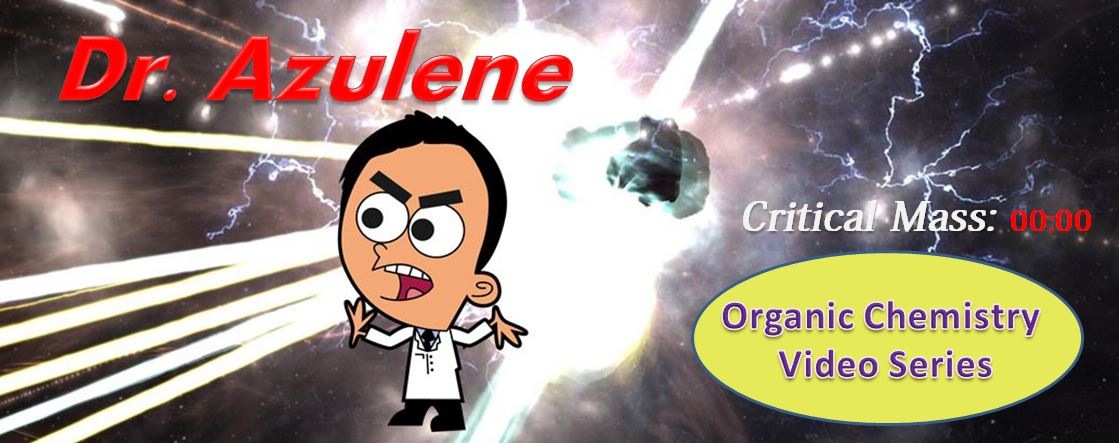How To Ace Organic Chemistry (Part I)
Want to Ace Organic Chemistry? Organic chemistry is in-depth and has three-dimensional aspects. Although it begins with remedial concepts and trends in the periodic table. Students feel some level of familiarity with these tidbits while concepts are then built upon those definitions.
While one doesn't realize it, types of bonds, definitions of acids and bases, and so on which "feel" and seem simple or repetitive are or can be deceptive since it's assumed to be already well-understood. That feeling is your ego and it will damage you if you don't let that ego take some damage first. Let it go. Rid yourself of the indoctrination general chemistry has exposed you to. These concepts have far greater significance than you can imagine yet.
To ace organic chemistry you have to stay ahead or keep up from day one (or sooner). What you don't realize at the beginning is that it is the most important concepts are already slipping past you unaware. Many who get lost in the first month without realizing it face an uphill fight by mid-semester just to pass. Is this an exaggeration? Hardly. It is reality as the vast majority who have been through it will tell you. Most feel like "I want to start from the beginning because I got lost somewhere and don't get it." That's the point of this site and the video collection: to end that costly and enduring misfortune for as many non-chemistry-inclined students as you and I can.
Get the e-Book : Organic Chemistry Easier

What do you mean "Ace Organic Chemistry"?
If you are in college, you have probably done very well in at least one course. If you have aspirations for post-graduate study or wish to earn distinction in your major field of study, you are almost certainly doing very well in the majority of your courses, and your chosen field of study, in particular. This is because of certain desirable habits you tend to exhibit. So I don't need to describe this if we're on the same page. Have you done tremendously well before in an upper division course? If you have, how did it feel? What did you go through to make it happen?
You did what everyone in higher education advises you to do.
The operative word in all these rhetorical questions is not the course, or the instructor, but you. Have you finished a course managing enough to eke out an "A"? Did you rely on statistical grading or a "curve" to happen to nab it? Did you get an "A" and still felt loose ends and incomplete understanding? If you did, you won't remember very much, not for very long. It's estimated that people tend to retain at most 2-5% of the subject matter of college. That's probably even a bit inflated.
Why Learn it Well?
Most people will need to retain the know-how to answer organic chemistry questions again for any pre-professional admissions test in the sciences or medical fields later on. Organic also helps make biochemistry easier. There you will be seeing the same functional groups, memorizing amino acids etc. Even before that, you have to retain enough to function during the second semester. This course remains relevant so passing is okay but understanding it well enough to remember the fundamentals matters. Re-learning it later or learning it for the first time in preparation to take the MCAT, for example, is not an enviable position to be in.
Keeping it real, you know what college is about at this point. College is about You. To truly ace a course means not only was your grade the highest possible but you did all the studying, read everything, got interested in related topics because that understanding propagated outward to your real world. It was important to you and you made it a top priority. You left the course understanding almost every detail and although those details may slowly recede, you learned the definitions, concepts and skills so well that you could teach it to your grandma. That's what acing a university class is.
With that in mind, consider organic chemistry again.
Like any other course, you will have to do the same sorts of things to ace organic chemistry. But it will require even more. Whatever course you were in (unless it was organic chemistry, which people do ace), double that effort and pace. Make it a point to do one problem a day. Just one. You will find yourself doing more than that if you have the solutions manual and can follow both. The hardest part is always starting.
For, example. There is a flood of terminology to memorize. The terminology is known as organic nomenclature. Naming compounds is the ability to do this (stereochemical prefix)(substituents) (meth-, eth-, prop-, but-,..)(an/en/yn)(suffix of the highest priority functionality). That's it.
Organic Chemistry requires no more memorization than you needed for other classes. General chemistry had a great deal more rote memorization (names and formal charges of polyatomic ions, solubility rules, several definitions, laws, and principles) too.
Really only two handfuls of reaction classes (ten) are involved in two semesters of organic. If you think of it, like we do, there's only a handful of stuff. This first semester includes:
- Addition
- Substitution
- Elimination
- Oxidation/Reduction Reactions
- Radicals
Find the commonalities in the single questions you answer and you'll see there is just a functional group, and what you tend to do it to make it change. Second semester will be more of the remaining functional groups. Depending of the quality of the chemistry department you might see:
- Aromatic Substitution
- Aldehydes and Ketones
- Carboxylic Acid Derivatives
- Enols and Enolates (Reactions at the α-carbon)
- (possibly) Pericyclic Reactions (beyond just the Diels-Alder [4+2])
- (possibly) Bioorganic Molecules
If you understand mechanism and arrow-pushing then you understand Organic Chemistry the way an organic chemist does. The rest is learning the reagent alphabet soup (e.g. NaBH4, BH3, H2O2, Hg(OAc)2, H2O) etc. But you'll be using them repeatedly. If you have an adequate understanding of mechanism, remembering reagents is not difficult as they are of learning the mechanism which means doing problems and drawing the mechanisms of the reactions enough times. Repetition is a must because remember Organic Chemistry is a skill which you must build upon. Once you get the main point (knowing enough how to make more complicated structures) you will just use what you learn (the reactions) as tools.
The reagent determines the reaction. The reactions come one at a time at a furious pace usually at the same time as a new reaction. If you don't understand the mechanism, the reagents are just alphabet soup you have to memorize with no context. This is a precarious and worsening scenario. Usually there are atoms or groups in the reagent that end up in the compound. Often, many things around the reaction arrow do not like some metals (like Pt, Ni) that catalyze reactions. It's just that applying them or recognizing them for what they are takes at least five times hearing, seeing, and especially writing it on your own.
Often lectures will make little or no sense beyond the topic name. That heavy 1,000+ page book is probably among the harder, if not the hardest, things you will ever read in your life as it was for me to that point. Don't think this is an attempt to make you fearful. This is what I took away from my experience and it is the experience of most people. Just prepare yourself for it and it will be much easier on you. Acing a class is more than just the letter grade you get.
You can do it.
People do. If you are unrelenting, you will learn it. People learn it on their first try and crush it. It will be one of the biggest challenges of your academic career to do so. You will have to place disproportionate study time toward this subject which will detract from others you're taking. The biggest mistake poorly-performing students fail to do is to make use of every available resource. Your textbook contains all you need to know. But it's a slow read. Skim through it then read it again. If you get stuck read past what is too abstract for you in those sections and go back later. Occasionally visit office hours with genuine questions even if they seem "dumb" to you. Talk to other people in your class and find someone or a group to commiserate with. This decreases the isolation and alienation you might feel. Carefully absorb the content with enough time left to review and never put yourself in a position to cram. No one can successfully cram for organic chemistry (without serious and incredibly expensive help). Cram to pass, sure. But this was never about just passing.
This is a general list, so get a feel for what will be required. This blog is about making each of these things easier, streamlined, and manageable. Try to approach these ideals and if you have these goals on your agenda, you will be on the road to probably ace the class.
Get the ebook: Organic Chemistry Easier
including the 8 Cardinal Mistakes Made by Students of Organic Chemistry,
simply register for the newsletter.


Ready to conquer organic chemistry with confidence? Explore our services and resources now to start your journey towards success! Join our community of learners and unlock your full potential in organic chemistry. Let's embark on this exciting journey together. Get started today!
Read More